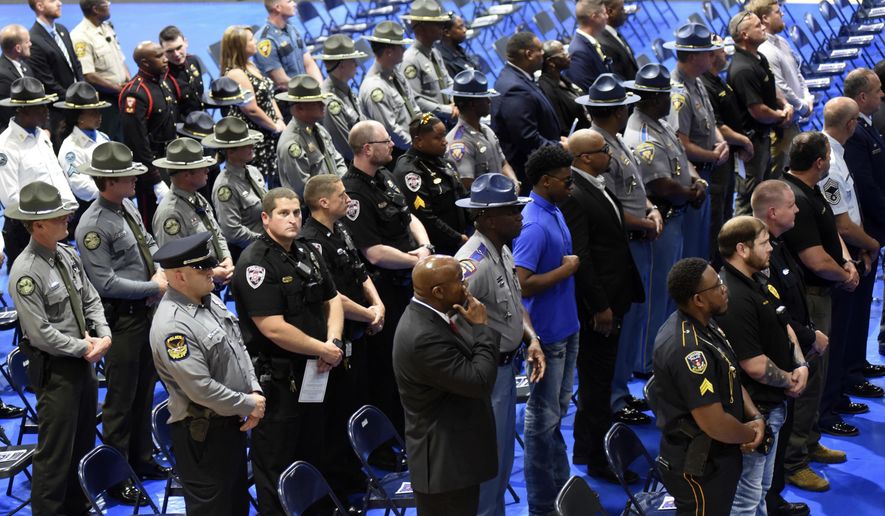OPINION:
Six years ago, the law enforcement community experienced one of its darkest periods in recent memory.
On July 17, 2016, in Baton Rouge, Louisiana, three police officers were shot and killed in an ambush-style attack by a deranged lone gunman. A fourth officer, gravely wounded in the shooting, ultimately succumbed to his injuries earlier this year after enduring years of rehabilitation. Two other officers were seriously injured.
That tragedy came on the heels of another mass-casualty event aimed at Dallas-area police officers only a week before. Five police officers lost their lives in that shooting, with another nine seriously injured.
At the time, I was in the waning months of a nearly two-decade career in law enforcement. While I had seen police and community relations ebb and flow over the years and understood that violence directed against police officers was nothing new, the extreme violence, moral depravity, and callous indifference among some toward the murders in Dallas and Baton Rouge felt different.
In the aftermath of Baton Rouge, I wrote, “What we are experiencing right now no longer feels isolated. It no longer feels extraordinary. Sadly, this extreme violence against our men and women in blue is beginning to feel routine.”
Those attacks occurred at what at the time felt like a generational nadir in police and community relations, actively under the strain of an aggressive and growing anti-police movement spurred on by high-profile events sensationalized by a media more inclined toward inflaming public passions than being the neutral purveyor of facts.
While tensions eased over the next few years, the 2020 death of George Floyd in Minneapolis rekindled them. The ensuing civil unrest, riots, and violence that marked the response to Mr. Floyd’s death inspired the contemptible “defund the police” movement — a misguided narrative that systematically diminished respect for the rule of law and gave cover to far-left activists looking to pursue the irresponsible dismantling of our traditional criminal justice system in favor of one predicated on vague notions of social justice.
Unfortunately, this sustained anti-police narrative led to predictably disastrous results. Cities that cut funding for their police departments soon experienced rising crime rates. Activist prosecutors that declined to charge repeat offenders and actively sought decriminalization policies saw the normalization of chaos and unrepentant criminality take hold of their communities.
Recruiting and retention in law enforcement reached historic lows, contributing to dangerously low staffing levels in many cities across the country and necessarily reducing the proactive police work that is essential to reducing criminal activity as opposed to merely responding after the fact.
While the damage caused to the law enforcement community and to public safety by years of anti-police rhetoric and their follow-on policies may continue, action can be taken today to restore sanity to the criminal justice system and reinvigorate the law enforcement profession.
Society must reestablish basic respect for the law enforcement profession, recognizing the essential role it plays in supporting safe and secure communities. There will always be risks associated with a career in law enforcement, but few people will undertake those risks if society does not recognize the inherent nobility of a life given to service.
Elsewhere within the criminal justice system, the public must demand that individuals endowed with the public trust and given the authority to hold criminal violators accountable do so. Activist prosecutors trying to pursue social justice by abdicating their prosecutorial authority undercut the criminal justice system.
To function properly, the criminal justice system must be antagonistic, with both sides of the system pursuing with equal vigor the interests of those they represent — prosecutors defending the interests of the state and law-abiding citizens while public defenders and defense attorneys advocate for the rights of the accused. Justice cannot be served when those roles become indistinguishable from one another.
Reflecting upon the anniversary of the tragedies in Baton Rouge and Dallas, it is difficult to underscore the amount of damage that has been done to public safety and the law enforcement profession in the ensuing years. Rising crime rates and social dysfunction may feel like a permanent condition of life today, but they do not have to be an indelible part of our communities moving forward.
In honoring the memory of those lost six years ago and the countless other officers who have been killed or injured in the line of duty before and since, we can begin to turn the corner on rising crime rates and reduced quality of life in our communities by acknowledging and affirming the sanctity of the rule of law and the virtue of those sworn to uphold it.
• Scott G. Erickson is the director of the Center for Law and Justice at the America First Policy Institute. He previously served at the Department of Homeland Security, concluding his service as the acting chief of staff, and earlier spent nearly 20 years as a uniformed police officer in San Jose, California.




Please read our comment policy before commenting.